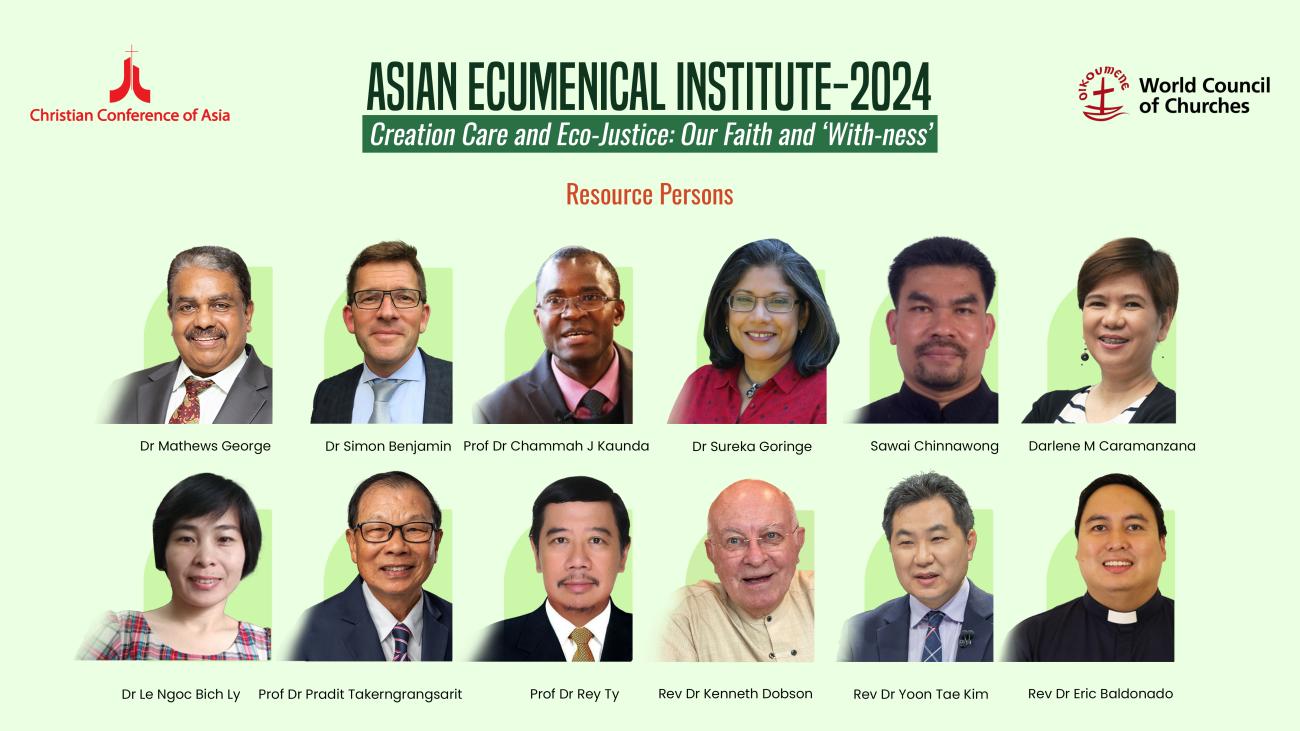Asian Ecumenical Institute–2024 set to begin

Chiang Mai, Thailand: The Asian Ecumenical Institute (AEI), a month-long annual ecumenical formation training is set to commence from 21 July, 2024 on the theme Creation Care and Eco-Justice: Our Faith and ‘With-ness’.
AEI–2024 will be jointly organized by the CCA and the World Council of Churches (WCC). The AEI will be held at the CCA headquarters on the Payap University campus, Chiang Mai, Thailand. Twenty-four participants selected from across Asia will attend this year’s month-long residential programme.
Highlighting the interconnectedness between faith and creation care in the context of ecological crisis, the deliberations at the AEI will help the participants learn about eco-justice from deeper biblical theological perspectives, and emerging socio-economic and political contexts in Asia.
In addition to main thematic focus related topics such as Care for the Creation in God’s Oikos; Ecumenism, Economics, and Ecology; God’s Redemptive Providence and God’s Creation, other topics which will be covered in various sessions include ‘God’s peace with Justice: Interfaith Perspectives’; ‘Doing Mission with Intergrity with an Ecumenical Framework’; ‘Transforming Mission in Changing Global Society’; ‘Doing Mission in a rapidly changing society’; ‘Ecumenical Missiology and Grassroots Ecumenism’; ‘Ecumenism and Ecumenical Movement’; ‘Vital Issues and Ecumenical Concerns of the Ecumenical Movement Today’; ‘Mission and Diakonia in Churches’; ‘Rhythms of Asian Spirituality’; ‘Peace and Security in Asia’; ‘Artificial Intelligence and Informed Spirituality’; ‘Christian Mission and Evangelism in an Era of Artificial Intelligence’; ‘Post Humanism and Missiological Hope’, Geopolitical Trends in Asia’, etc.
Internationally acclaimed theologians, biblical scholars, social scientists, ecumenists, peace activists, development practioners, and environmental activists will facilitate academic lecture sessions.
Resource persons of AEI–2024 include Prof Dr Chammah Judex Kaunda (Zambia), Assistant Professor of World Christianity and Theology, Yonsei University, South Korea; Prof Dr Simon Benjamin (Germany), Dean of Ecumenical Institute at Bossey/World Council of Churches, Geneva, Switzerland; Darlene Marquez Caramanzana (Philippines), General Board of Global Ministries of the United Methodist Church, USA; Rev Dr Eric Baldonado, United Church of Christ in the Philippines; Rev Dr Kenneth Dobson (USA), Advisor at the Payap University; Dr Le Ngoc Bich Ly (Vietnam), Chairperson of Peace Studies at Payap University, Thailand; Dr Mathews George Chunakara (India), General Secretary of CCA, and Moderator of Commission of the Churches on International Affairs of the WCC; Prof Dr Pradit Takerngrangsarit (Thailand), former President of the Payap University and Dean of McGilvary Divinity School; Prof Dr Rey Ty (Philippines), Institute of Religion, Culture, and Peace Lab (RCPL), Payap University; Sawai Chinnawong, Thai Artist/Painter who depicts Biblical narratives in a Central Thai (Buddhist) setting; Dr Sureka Goringe (Australia), Development Analyst and Director of Uniting Church in Australia; and Rev Dr Yoon Tae Kim (South Korea), Presbyterian Church of Korea.
Visits to inter-religious centres and dialogue with religious leaders, interactions with ethnic and migrant communities from conflict affected areas, and worshiping on Sundays with diverse indigenous Christian communities belonging to different language and ethnic groups are also integral parts of the month-long programme.
The AEI will be opened with an inaugural address by CCA General Secretary Dr Mathews George Chunakara on Monday, 22 July 2024.










